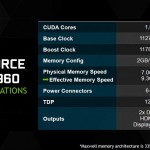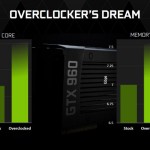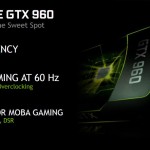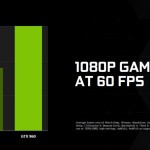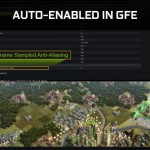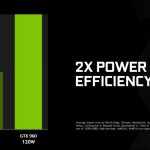Last year the GeForce GTX 980 was revealed and with the power of four Xbox Ones worth of shader processing power on offer. While that’s pretty good it’s also quite heavy on the pocket.
For gamers who want to pack the punch on a Gaming Rig for under INR 50K, the GTX 960 gives you half the power of a GeForce GTX 980. Better yet, because it’s based on Nvidia’s ultra-efficient Maxwell architecture, the GTX 960 ought to perform much better than its specs would seem to indicate. Can the GTX 960 live up to the standards set by its older siblings? Let’s have a look.
The GTX 960 is a pretty significant product in the line for Nvidia. The GeForce GTX 970 and 980 have been a runaway success. But most people or say gamers as well don’t buy high-end graphics cards. Even among PC gamers, less expensive offerings are more popular. And the GTX 960 lands smack-dab in the “sweet spot” where most folks like to buy. So if it is about Rs 15K – 20K price range sounds good to you, then you’re definitely not alone.
The GM206 has two graphic processing clusters, almost complete GPUs unto themselves, with eight shader multiprocessor (SM) cores per cluster. Here’s how the chip stacks up to other current GPUs.
Interestingly, Nvidia identifies the Radeon R9 285 as the GTX 960’s primary competitor. The R9 285 is based on a much larger GPU named Tonga, which is the only new graphics chip AMD introduced in 2014.
Testing Methods :: GeForce GTX 960
With the addition of the 960, the GeForce GTX 900 series now extends from somewhere around Rs 16,000 to upwards of Rs 40,000. Like its bigger siblings, the GTX 960 inherits the benefits of being part of the Maxwell generation. Those include support for Nvidia’s nifty Dynamic Super Resolution feature and some special rendering capabilities that should be accessible via DirectX 12.
- ASUS Strix Edition GeForce GTX 960 Graphics Card Review
- ASUS Strix Edition GeForce GTX 960 Graphics Card Review
- ASUS Strix Edition GeForce GTX 960 Graphics Card Review
- ASUS Strix Edition GeForce GTX 960 Graphics Card Review
- ASUS Strix Edition GeForce GTX 960 Graphics Card Review
- ASUS Strix Edition GeForce GTX 960 Graphics Card Review
- ASUS Strix Edition GeForce GTX 960 Graphics Card Review
- ASUS Strix Edition GeForce GTX 960 Graphics Card Review
Furthermore, with a recent driver update, Nvidia has made good on its promise to deliver a new antialiasing mode called MFAA. MFAA purports to achieve the same quality as 4X multisampling, the most common AA method, with about half the performance overhead.
Also, the GTX 960 has one exclusive new feature: full hardware support for decoding H.265 video. Hardware acceleration of H.265 decoding should make 4K video playback smoother and more power-efficient. This feature didn’t make the cut for the GM204, so only the GTX 960 has it.
| GPU base clock (MHz) |
GPU boost clock (MHz) |
ROP pixels/ clock |
Texels filtered/ clock |
Shader pro- cessors |
Memory path (bits) |
GDDR5 transfer rate |
Memory size |
Peak power draw |
|
| GTX 960 | 1126 | 1178 | 32 | 64 | 1024 | 128 | 7 GT/s | 2 GB | 120W |
| GTX 970 | 1050 | 1178 | 64 | 104 | 1664 | 256 | 7 GT/s | 4 GB | 145W |
| GTX 980 | 1126 | 1216 | 64 | 128 | 2048 | 256 | 7 GT/s | 4 GB | 165W |
While the GTX 970 and 980 have 4GB of memory, the GTX 960 has 2GB. That’s still a reasonable amount for a graphics card in this class.
Notice that the GTX 960’s peak power draw, at least in its most basic form as Nvidia has specified, is only 120W. That’s down from 140W in this card’s most direct spiritual predecessor, the GeForce GTX 660. Maxwell-based products just tend to require less power to achieve even higher performance.
Benchmarks
The Asus Strix GTX 960 is the most sensible of the cards we have on hand. With a single six-pin PCIe aux power input, which is technically all the GTX 960 requires the Strix has higher-than-stock GPU clock speeds and is the lone product in the bunch with a tweaked memory clock.
Far Cry 4
The GTX 960 starts off with a pretty amazing performance in Far Cry 4. The GTX 960 looks to be every bit the equal of the GeForce GTX 770.
These “time spent beyond X” graphs are meant to show “badness,” those instances where animation may be less than fluid—or at least less than perfect. The 50-ms threshold is the most notable one, since it corresponds to a 20-FPS average. For the most part, these results confirm what we’ve already seen above. The GTX 960 is just delivering smoother animation here.

Although these two cards have almost identical 99th percentile frame times, the GTX 960 actually fares better in our “badness” metrics. So even though the GTX 960 is based on a smaller chip with less memory bandwidth, its performance is less fragile than the GTX 770’s.
DOTA 2
MOBAs are ultra-popular and don’t really require much GPU power. I tried DOTA 2 and it ran at something crazy like 350 FPS on the GTX 960. So I cranked up the quality options in DOTA 2 and raised the display resolution to 2560×1440. Then I played back a portion of a game from the Asia championship tourney, since I lack the skills to perform at this level myself 🙂
I don’t think the GTX 960 and the Radeon R9 285 could be more evenly matched than they are in ourDOTA 2 test. Then again, you don’t need much video card to run at a constant 60 FPS in this game.
A word on Power Consumption
Big coolers are pretty much overkill for the GTX 960 at stock clocks. The Asus Strix GTX 960, is quiet enough under load to hit our noise floor—we’re talking whisper quiet here—while keeping the GPU at 60°C. Jeez.
Conclusion
From the GTX 660 to the GTX 960, Nvidia improved performance substantially with only a tiny increase in measured power draw. Nvidia has made big strides in efficiency with the introduction of Maxwell-based GPUs, and the GeForce GTX 960 continues that march. Clearly, Nvidia has captured the technology lead in GPUs. Prices are competitive but still can be made better 🙂
Pricing for GTX 960
ZOTAC
Zotac Standard edition – MSRP 16490
Zotac OC edition – MSRP 17490
Gigabyte
GVN960G1 gaming 2 GD- MSRP 19,900
GCN960WF20C 2GD -MSRP 17,900
MSI
Gaming Edition – MSRP 22,990
Asus Strix edition
MSRP – 19,500



